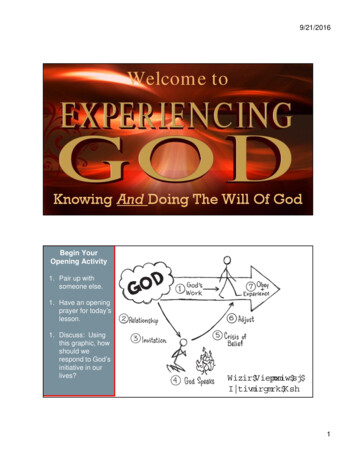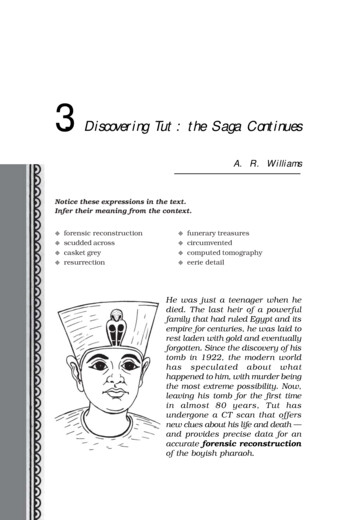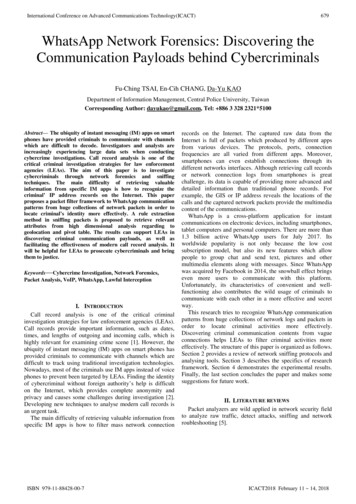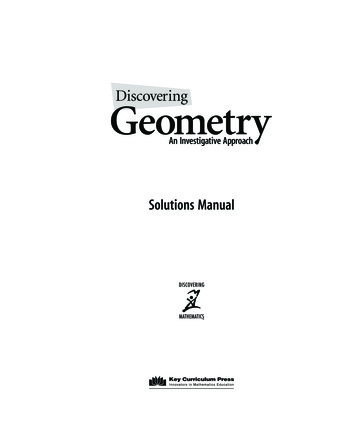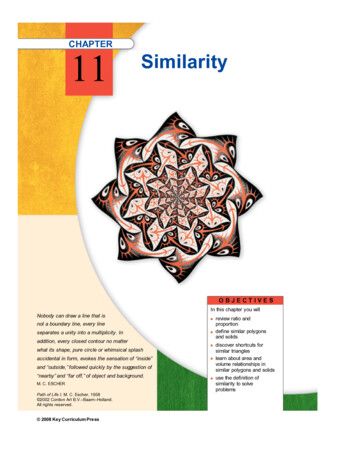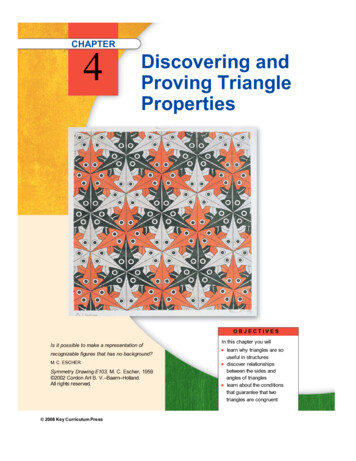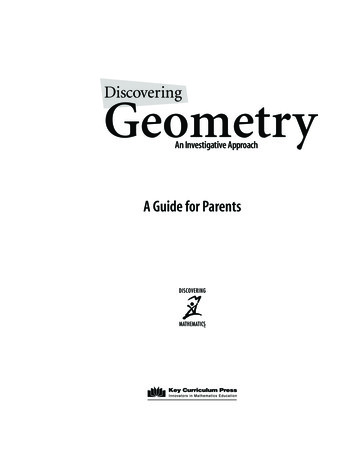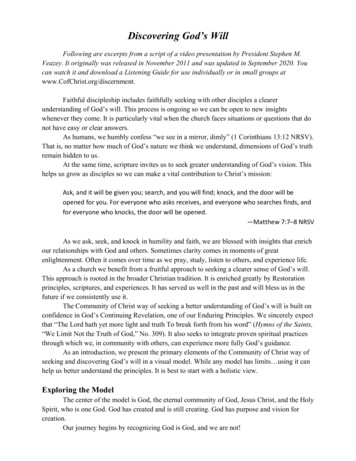
Transcription
Discovering God’s WillFollowing are excerpts from a script of a video presentation by President Stephen M.Veazey. It originally was released in November 2011 and was updated in September 2020. Youcan watch it and download a Listening Guide for use individually or in small groups atwww.CofChrist.org/discernment.Faithful discipleship includes faithfully seeking with other disciples a clearerunderstanding of God’s will. This process is ongoing so we can be open to new insightswhenever they come. It is particularly vital when the church faces situations or questions that donot have easy or clear answers.As humans, we humbly confess “we see in a mirror, dimly” (1 Corinthians 13:12 NRSV).That is, no matter how much of God’s nature we think we understand, dimensions of God’s truthremain hidden to us.At the same time, scripture invites us to seek greater understanding of God’s vision. Thishelps us grow as disciples so we can make a vital contribution to Christ’s mission:Ask, and it will be given you; search, and you will find; knock, and the door will beopened for you. For everyone who asks receives, and everyone who searches finds, andfor everyone who knocks, the door will be opened.—Matthew 7:7–8 NRSVAs we ask, seek, and knock in humility and faith, we are blessed with insights that enrichour relationships with God and others. Sometimes clarity comes in moments of greatenlightenment. Often it comes over time as we pray, study, listen to others, and experience life.As a church we benefit from a fruitful approach to seeking a clearer sense of God’s will.This approach is rooted in the broader Christian tradition. It is enriched greatly by Restorationprinciples, scriptures, and experiences. It has served us well in the past and will bless us in thefuture if we consistently use it.The Community of Christ way of seeking a better understanding of God’s will is built onconfidence in God’s Continuing Revelation, one of our Enduring Principles. We sincerely expectthat “The Lord hath yet more light and truth To break forth from his word” (Hymns of the Saints,“We Limit Not the Truth of God,” No. 309). It also seeks to integrate proven spiritual practicesthrough which we, in community with others, can experience more fully God’s guidance.As an introduction, we present the primary elements of the Community of Christ way ofseeking and discovering God’s will in a visual model. While any model has limits using it canhelp us better understand the principles. It is best to start with a holistic view.Exploring the ModelThe center of the model is God, the eternal community of God, Jesus Christ, and the HolySpirit, who is one God. God has created and is still creating. God has purpose and vision forcreation.Our journey begins by recognizing God is God, and we are not!
It continues by shedding our agendas or current conclusions. This “holy indifference” isoften the most difficult step. We can achieve it only through spiritual trust that quiets our willfulegos and fear of losing control. The constant call is to let God be God!Connecting our lives with God’s truth is a primary ministry of the Holy Spirit. The Spiritopens our eyes, ears, hearts, and minds to see the proper application of divine will. It moves inand among people to bear witness, renew life, form community, and open future possibilities inharmony with God’s will.Spiritual attention and spiritual practices help us better respond to the Holy Spirit.Spiritual attention is an attitude of being open and alert to the Spirit’s presence. Spiritualpractices include spiritual centering, quiet, prayer, creative scripture study, fasting, andmeditation.The next layer of the model identifies “lenses” through which we gain a better sense ofthe Spirit’s witness. In Community of Christ these are: ScriptureReason and knowledgeTraditionPersonal and community experienceContinuing RevelationCommon consentTo discover a clearer sense of God’s will we apply our understanding of the church’smission and life together in Christ. The area outside various elements of the model is defined asEmbody Christ’s Peace.Just as Jesus Christ, the Word made flesh, is our peace (See Ephesians 2), we are calledto embody our best understanding of the peace of God through Christ in our lives and the world.Sometimes this requires us to revise attitudes, beliefs, and practices with ones more attuned todivine nature. This is spiritual growth. The Apostle Paul describes this process in Ephesians 4:13as growing in the “full stature of Christ.”Exploring Community of Christ LensesScriptureScripture is essential to understanding the nature and will of God. In the church’s officialscripture statement, “Scripture in Community of Christ,” we uphold scripture as indispensable!We also teach that scripture must be applied through the lens of God’s most decisiverevelation in Jesus Christ. God’s Word, which is God’s creative and reconciling activity, is notrevealed fully in the words of any language, but in a person who was fully human and fullyDivine. Therefore, all scripture stands under the scrutiny and authority of God’s revelation inJesus Christ.So if specific scriptures don’t agree with our best understanding of the revelation of Godin Christ, the love, teachings, and vision of Christ prevail.
The view that stirs the most discussion is the church’s stance that scripture’s authoritydoes not come from the belief that it is historically, scientifically, ethically, and theologicallyperfect. Why is this so?Scriptural literalism is a fairly recent trend pushed hard in Christianity byfundamentalism. A vocal minority within Christianity insists on a literal, inerrant reading ofscripture as the only reliable source of truth. In Community of Christ, we do not accept thisapproach.This is not a new position.We do not consider it [the Inspired Version] infallible, nor do we consider the Bibleinfallible. We do not consider anything that passes through human hands to beinfallible. We do not believe in the plenary inspiration of the Bible; we hold thateverything which passes through human hands is fallible.—Joseph Smith III, evidence in the Temple Lot suitOur church teaches that scripture is inspired and essential to our knowledge of God. Weinsist that scripture should be interpreted responsibly through informed study guided by theSpirit.In other words, understanding scripture is not just a matter of reading a passage andassuming what it means for all times and places. Responsible interpretation is done in dialoguewith others and includes study, prayer, reason, tradition, and Continuing Revelation as guided bythe Holy Spirit.Doctrine and Covenants 164:6c reminds us:Faced with difficult questions, many properly turn to scripture to find insight andinspiration. Search the scriptures for the Living Word that brings life, healing, and hopeto all. Embrace and proclaim these liberating truths.This counsel encourages us to search within scripture for the “Living Word.” It ispresented and received as good news in the lives of hurting people. It draws people to God’srevelation in Jesus Christ. It bears the fruit of love, reconciliation, healing, and hope for all.Reason and KnowledgeAnother important lens is reason and knowledge. This lens affirms that we have to useour minds and available knowledge to strengthen our understanding of God’s ways.I was told a story once about the scientist, George Washington Carver. One day Mr.Carver was in a peanut field. He stooped and pulled a peanut plant from the ground. Holding it tothe sky he said, “Creator, what is in this peanut plant?” As the story goes, the Creator responded,“George, I have given you a good mind, you figure it out!”From the church’s earliest days, members were urged to “study it out in your mind”(Doctrine and Covenants 9:3b) and to “become acquainted with all good books” (Doctrine andCovenants 87:5b) to learn truth. We have always been a people who sought greater
understanding of truth through “study and faith.” For example, in 1968, when the church wasfacing complex social and theological issues, the following counsel was given:My servants of the leading quorums are commended for their diligence in seeking morelight and truth from all available sources. For have I not told you that my glory isintelligence and he that seeketh learning by study and by faith will be rewarded?—Doctrine and Covenants 149:5Consideration of available information is not the opposite of trusting in the Spirit. Studyand thinking are how we love God with our hearts and our minds.Knowledge about many aspects of creation, including human life, has increaseddramatically over the centuries. This includes information not even conceivable to those whoshaped scripture in earlier centuries. The task of continued interpretation, through faith andstudy, is left to us and future generations.However, it is important that we do not take the insights of scholarship and science atface value. In faith matters, conclusions of the human mind must be considered carefully andtheir value determined through prayerful reflection and Spirit-led deliberation.TraditionTradition is the body of belief, wisdom, and practices produced over the years as the faithcommunity seeks to live the gospel. It includes the larger Christian tradition and our ownCommunity of Christ story. If we lose touch with our faith tradition, we lose an important sourceof identity and guidance.Tradition is not a matter of rigidly maintaining positions or practices. Rather, tradition isthe faith community’s ongoing conversation with its sacred story, Enduring Principles, theology,and policies.Tradition, when understood in this way, identifies the church’s recognized sources ofofficial reference and teaching. In Community of Christ, that includes: ScriptureBasic Beliefs statementEnduring Principles (core values)HymnsChristian and Restoration historyWorld Conference resolutionsOfficial interpretations by church leadersOfficial statements by World Church leadership bodiesOfficial administrative policies and proceduresWhile affirming tradition’s value, it is equally important to recognize times when newsituations and the Spirit’s movement challenge tradition. We have only to recall Peter’s rooftopvision that set the early Christian church on the path to becoming more inclusive of Gentiles tounderstand this principle (Acts 10).
A more recent example is the church’s acceptance of prophetic counsel that called for theordination of women (Doctrine and Covenants 156).Regarding tradition, the church is counseled:Be respectful of tradition and sensitive to one another, but do not be unduly bound byinterpretations and procedures that no longer fit the needs of a worldwide church. Insuch matters direction will come from those called to lead.—Doctrine and Covenants 162:2dPersonal and Community ExperienceObviously, we bring our personal experiences, culture, beliefs, feelings, and personalitiesto our quest to better understand God’s will. Any experience that is thought about orcommunicated to others is interpreted experience.That is why personal experiences among individuals can be quite different. Sometimesthere even can be “dueling testimonies” of the Spirit’s guidance. This is especially true whenconsidering sensitive, emotional, or complicated issues.In Community of Christ, we take the wide range of personal experiences seriously as weseek direction. Struggling with diversity of experience is an important aspect of becoming realcommunity.However, as a general rule, personal experience and intensity of feelings should not beone’s primary or only authority in faith matters. Because of our fallible natures, personalexperience must be tested against the broader experience and wisdom of the faith community.The most reliable spiritual discernment occurs with others. We have been counseledrecently to “listen together” to the Spirit’s voice (Doctrine and Covenants 162:5c).Obviously, “listening together” includes being open to the Spirit’s movement duringdiscussions in small groups, congregations, and national, field, and World Conferences.While some understand shared experiences in different ways, collective experience as “aprophetic people” is vital. As we seek to better know God’s will, our faith community mustconsider its shared experience of the Spirit’s guidance.Continuing RevelationWe believe in the importance of Continuing Revelation to establish direction for thechurch. Our Basic Beliefs call us to be a “prophetic people.” We hold thatGod graciously reveals divine will today as in the past” and that “in humility, individuallyand in community, we prayerfully listen to understand God’s will for our lives, thechurch, and creation more completely.—We Share: Enduring Principles, Continuing Revelation, page 12
When considering the “lens” of Continuing Revelation it is important to establish severalprinciples: Revelation is encounter with God that involves God’s self‐disclosure. It comes whenand how God chooses.Human response to revelation always involves interpretation because its meaning iscommunicated through the filters of the human mind and language.There are revelatory experiences in religious movements regarded as foundationaland formative. One example is God’s action to free the Hebrew slaves as describedin the Book of Exodus. Another example is God’s self‐disclosure and real presence(incarnation) in Jesus Christ.Continuing Revelation involves ongoing encounter with God and Jesus Christthrough the Holy Spirit. It provides added insight or deepens understanding offormative experiences. It “unveils” dimensions of earlier encounters with God thathave been unrecognized or perhaps misunderstood.Continuing Revelation often is equated with prophecy, and prophecy often isdefined as predicting the future. That is a limited definition of prophecy. ContinuingRevelation is not so much forecasting the future as it is presenting inspired conceptsand vision that help create the future for which God yearns.In general practice, Continuing Revelation involves study, prayerful reflection, spiritualpractices, and discernment that helps groups perceive God’s will more fully.In the worldwide church, we express our belief in Continuing Revelation through theprophet-president’s calling to bring inspired counsel. If the World Conference approves inspiredcounsel for the Doctrine and Covenants, it becomes part of the church’s scripture. This meansscriptural interpretation must take into account the whole body of scripture, including the mostrecent sections of Doctrine and Covenants.Given our natural tendency to want to settle down where we are comfortable, ContinuingRevelation keeps the church moving toward fulfillment of God’s vision as revealed in JesusChrist.The use of a “living body of scripture” can be extremely challenging. ContinuingRevelation often brings new ideas or insights about long-standing beliefs. This causes somepeople to resist what is being shared because it unsettles what they thought was certain.A ministry of the Holy Spirit is to help the church trust and embrace ContinuingRevelation, especially when acceptance calls for revisions of long-held practices. The church hasbeen told: as you gain ever more confidence in sensing the leadings of my Spirit, you will begin tosee with new eyes, embrace the truths that are waiting for your understanding, andmove joyfully toward the fulfillment of the tasks that are yours to accomplish.—Doctrine and Covenants 159:8
Common ConsentAnd all things shall be done by common consent in the church, by much prayer andfaith; for all things you shall receive by faith.—Doctrine and Covenants 25:1bJoseph Smith III defined the church as a theocratic democracy. This means God’s Spiritleads the church. The Spirit leads through leaders who are approved and supported by the will ofthe people. It also means members have a significant role in determining church direction inresponse to the Spirit’s guidance.Common consent helps ensure the church uses all the “lenses” and that no one person’sor group’s perspective dominates.Common consent is open consideration of issues, in a spirit of worship, during which allopinions may be voiced. It includes thorough consideration of proposals in conferences at alllevels. It also involves consideration of inspired counsel at World Conference, which then canbecome authoritative throughout the church.Ideally, common consent is much more than decision making by simple-majority vote. Atthe same time, common consent does not require unanimity.We achieve common consent when we consider all viewpoints through prayerfuldiscussion and when the church community expresses a sufficient level of support.Common consent at its best is a process of education, discussion, prayer, andconsideration. It requires patience, cooperation, and spiritual sensitivity. It encourages minorityor opposing voices that may contribute vital insights.Common consent is not perfect because it involves imperfect humans. It works todetermine the best decision at a given time under current circumstances.The foundational question for common consent is: “What is our best perception of God’swill for us together at this time under these circumstances” (Adapted from “Common Consentand Parliamentary Procedure,” Saints’ Herald, March 1974, page 3). Decisions made bycommon consent are always subject to future review through the Spirit’s guidance.Regarding common consent, the church has been told to trust the work of the Holy Spiritas it speaks in and through the voices in the faith community. Common consent has served thechurch well as a way of helping to determine direction when practiced in a spirit of prayer, love,and cooperation. The church continues to gain experience with alternative common-consentprocesses that help ensure a variety of perspectives is heard, minority voices are respected, anddecisions are made when there are high levels of support for proceeding in a certain way.Integrating the Various “Lenses”A key to effectively using the “lenses” is to understand they do not functionindependently. The Holy Spirit connects them as it illuminates truth and grows us as“responsible” disciples of Jesus Christ. Therefore the “lenses” are best understood asinterdependent.Another key to applying the Community of Christ way is to recognize that all elementsare not only important, but essential! If we focus on just one or two, we run the risk of missingsome vital dimension of God’s will.
ConclusionNow, as we begin to apply the Community of Christ way of discovering a clearer senseof God’s will, may we do so with confidence in our capacity to work together in patience andlove. Let us be encouraged and hopeful as we entrust our future to this promise:Beloved children of the Restoration, your continuing faith adventure with God has beendivinely led, eventful, challenging, and sometimes surprising to you. By the grace of God,you are poised to fulfill God’s ultimate vision for the church.—Doctrine and Covenants 164:9a
seeking and discovering God’s will in a visual model. While any model has limits using it can . Exploring the Model The center of the model is God, the eternal community of God, Jesus Christ, and

